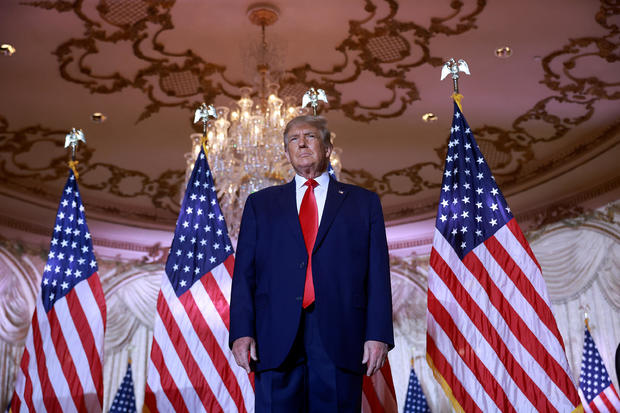Washington — The outside review of documents seized by the FBI from former President Donald Trump’s Florida resort will officially come to a close, as a ruling from a federal appeals court panel ordering its end took effect Thursday without an appeal from Trump.
The three-judge panel of the U.S. Court of Appeals for the 11th Circuit unanimously ruled last week that a federal district court judge erred when she appointed an outside arbiter, or special master, to review the roughly 13,000 records retrieved by the FBI when it executed a search warrant at Mar-a-Lago on Aug. 8. The former president, who requested the special master’s appointment, brought the documents with him from the White House to his South Florida property at the end of his presidency, and federal prosecutors have revealed in court filings that roughly 100 of those records were marked classified.
Justice Department Iinvestigators were also barred from using the unclassified materials for their its investigation into Trump’s handling of sensitive government records and whether there was possible obstruction of that probe. But the 11th Circuit’s decision lifted the injunction put in place by U.S. District Judge Aileen Cannon in September, giving investigators access to the tranche of unclassified documents taken by the FBI.
Trump spokesperson Steven Cheung said the former president will “continue to fight against weaponization of law enforcement and pursue appropriate legal avenues to obtain the items that were brazenly and illegally seized from his home during the Biden regime’s unconstitutional raid.”
An earlier decision from a different 11th Circuit panel allowed investigators to regain access to the batch of 103 documents with classification markings and kept them off-limits to the special master for the review.
Getty Images
The appeals court panel said its mandate would not take effect for seven days, giving Trump until Thursday to seek an emergency stay of the ruling and ask the full 11th Circuit to rehear the case or appeal to the U.S. Supreme Court.
Late Thursday afternoon, the 11th Circuit’s clerk sent a letter to the federal district court in Miami noting that the mandate had taken effect, capping the monthslong legal battle stemming from Trump’s request for the special master to vet the records.
The special master, U.S. District Judge Raymond Dearie, was set to complete his vetting of the seized documents by Dec. 16.
The decision by the three-judge panel — which consisted of Chief Judge William Pryor and Judges Britt Grant and Andrew Brasher — was a significant victory for the Justice Department, which has been probing Trump’s handling of sensitive government records for several months. Pryor was appointed by former President George W. Bush, while Grant and Brasher were appointed by Trump.
Attorney General Merrick Garland last month appointed a special counsel, Jack Smith, to oversee the Justice Department’s investigation into the retention of sensitive government documents at Mar-a-Lago and its separate probe into efforts to interfere with the transfer of power after the 2020 presidential election.
Trump asked Cannon in late August to appoint a special master to vet the materials taken from Mar-a-Lago, and she named Dearie, a semi-retired judge in Brooklyn, to review the documents for any that could be subject to claims of attorney-client or executive privilege.
Justice Department lawyers opposed the appointment of the special master, arguing in filings to Cannon and then the 11th Circuit that Trump could not assert executive privilege to preclude the review of executive branch documents by the executive branch itself.
But the former president’s legal team claimed to the 11th Circuit that Trump deemed the records he brought to Mar-a-Lago as “personal” while he was still in office, a designation allowed under the Presidential Records Act.
The 11th Circuit panel rejected that argument and noted that even if Trump did deem the documents as “personal,” federal investigators were still authorized to seize them pursuant to a search warrant.
The appeals court made clear the execution of the warrant was legal, writing that the federal magistrate judge who approved it “agreed that probable cause existed to believe that evidence of criminal violations would likely be found at Mar-a-Lago.”
Trump separately asked Cannon last month to order the Justice Department to provide him with an unredacted version of the affidavit laying out the government’s justification for the search warrant at Mar-a-Lago. A redacted version of the affidavit was made public in August.
The Justice Department’s investigation began after the National Archives and Records Administration retrieved 15 boxes of documents from Mar-a-Lago in January and found within them roughly 150 records with classification markings. About 300 documents marked classified have been recovered from Mar-a-Lago in all, including the 103 records taken in the August search, among which were “some indicating the highest levels of classification and extremely limited distribution,” prosecutors said.
Government lawyers have also claimed to Dearie that Trump may have commingled sensitive government documents with personal belongings from after his presidency. According to court filings, two classified cover sheets — one labeled SECRET and the second labeled CONFIDENTIAL — were allegedly mixed with three personal communications from after the end of the Trump administration. The communications were from a religious leader, an author and pollster, prosecutors said.
Robert Legare contributed to this report.
